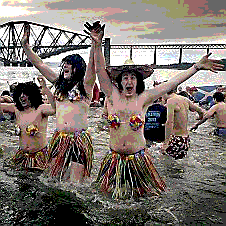

ThinkArt Lab Animation: A.T. Kelemen� November 12, 1998 Dr. Rudolf Kaehr
1 A fundamental theory of the natural
If there is anything left in this world we live which is still untouched and natural then it is the naturalness of the natural numbers-and nothing else.
"�Natural� because they are given at the outset, taken for granted as a founding, unanalizable intuition, outside any critique that might demand an account of how they come or came-potentially or actually-to �be�." Brian Rotman
0.5 Le nombre regle les representations culturelles."
0.6. Le nombre, evidement, regle l�economie, et sans doute est-ce la ce que Luis Althusser aurait appele la determination en derniere instance" de sa suprematie. L�ideologie des societes parlemantaire moderne, s�il y a une, n�est pas l�humanisme, le Droit du Sujet. C�est le nombre, le comptable, la comptabilite."
Alain Badiou, Le Nombre et les nombres. Seuil 1990
And why not Leopold Kronecker?
"God made the integers, all the rest is the work of Man."
As Natural as 0,1,2
Philip Wadler. Evans and Sutherland Distinguished Lecture, University of Utah, 20 November 2002.
"Whether a visitor comes from another place, another planet, or another plane of being we can be sure that he, she, or it will count just as we do: though their symbols vary, the numbers are universal. The history of logic and computing suggests a programming language that is equally natural. The language, called lambda calculus, is in exact correspondence with a formulation of the laws of reason, called natural deduction. Lambda calculus and natural deduction were devised, independently of each other, around 1930, just before the development of the first stored program computer. Yet the correspondence between them was not recognized until decades later, and not published until 1980. Today, languages based on lambda calculus have a few thousand users. Tomorrow, reliable use of the Internet may depend on languages with logical foundations. "
http://homepages.inf.ed.ac.uk/wadler/topics/history.html#drdobbs
Our whole economy of living and thinking would immediately crash, if the slightest change in the nature of natural numbers would occur.
If someone wants to achieve to be nominated as the most cranky mind, the crackpot par excellence, he/she/it should try to prove a paradox or even a defect in the very nature of the natural numbers.
Also such efforts are not unknown, they didn't have any impact on the nature of our natural numbers. It seems to be much more accepted to invent new and deviant logic systems than to change anything in arithmetics.
In my study, I will not touch these tabus. In contrary, I will accept them in all their principality, I even will celebrate them in disseminating them in their whole sacrality.
In doing so, the exclusive nature of the natural numbers will boil down to a very mundane activity in our cultural, that is, artificial world.
The naturality of the natural number system, as we know it, will be entangled in an activity of increasing artificiality of multitudes of natural number systems.
Also there is no culture without numbers, numbers are not cultural, but natural. They are the very nature in/of our culture. To transform this situation will change radically what we will understand by culture. The most advanced development of this classical arithmetical trance of naturality is still the global movement of digitalism and its technology.
In other words, my old question is still virulent: What�s after digitalism? (ISEA �98)
1.1 Natural number series
1.1.1 Natural numbers as models of fundamental abstract systems
"A first attempt at a theory to describe numbers begins with a fundamental abstr